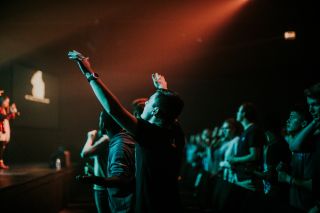Forgiveness
Asian-American Christianity in "Beef" and Beyond
A Personal Perspective: Experiencing desperation and turning to the church.
Posted May 3, 2023 Reviewed by Abigail Fagan

I recently watched the Netflix dark comedy Beef, where actor Steven Yeun costars as Danny Cho, a temperamental and reactive hothead who hits rock bottom following a road rage incident with Amy Lau played by comedian Ali Wong.
In one of his desperate moments, he decides to visit a Korean-American Christian church. His rough and tumble appearance didn’t match the neat and tidy image portrayed by the other congregants. But that’s exactly why the scene moved me. He was desperate. He looked desperate on the outside. Internally, he was desperate for God or at least desperate enough to walk into a church regardless of his fears of judgement.
For those who can resonate with that sense of desperation, we know a healthy Asian-American church can be such a blessing. The need for God’s grace and forgiveness portrayed by Yeun’s character catapulted me back 20 years when I was in my own rock bottom. I was getting laid off as a television journalist and my then-wife filed for divorce after learning about my compulsive sex and porn use. I had lost my identity in every sense of the word. I prided myself as a reporter and now that had been stripped from me. My marriage was also a source of pride that was eviscerated in front of my eyes. My addiction meanwhile added a complex layer of Asian cultural and religious shame that made me feel I was the scourge of the Earth and did not deserve God’s grace or forgiveness.
During this arduous period, I went to an Asian-American church and shared my challenges with the pastor. Instead of scorn, ridicule, blame or shame, he empathized with my struggle and suggested formal counseling. Instead of pushing me aside, he welcomed me to the front. Instead of worrying about how other parishioners might perceive me, he wept with me. This is what I needed at the time for my healing. An Asian-American church community that could embrace my brokenness.
Unfortunately, now as a therapist specializing in cultural issues and addiction, it’s not uncommon to hear Asian-American clients share of a vastly different experience where they were marginalized, blamed, and taken advantage of during their greatest time of need. This is where things get ugly. People in positions of religious power have used it to manipulate and deeply wound other fellow Asian Christians.
Growing numbers of Asians are leaving the formal church. The Asian-American church can struggle to connect with the world. Younger Asian Christians may have experienced hypocrisy, judgment, and moral failure within their church settings and want nothing to do with them.
In other toxic instances, the Asian-American church can lead to an inbreeding of fostering more Asian cultural shame, thereby making grace and forgiveness seem unattainable except to those who walk the “straight and narrow path”. There can be limited space for those who are questioning their faith or are unsure of a more traditional, rigid Asian church.
I still believe there’s hope for the Asian-American Christian church. In a healthy environment, it’s one of the few places where cultural shame can be deconstructed, and spiritual freedom can be experienced at the foot of the cross. But it’s not easy and won’t happen at every Asian Christian church but those churches that truly live out the gospel of faith, forgiveness, and regeneration may give the desperate what they’ve been spiritually yearning for.
References
Passport to Shame: From Asian Immigrant to American Addict


